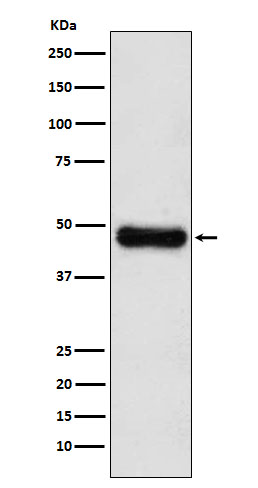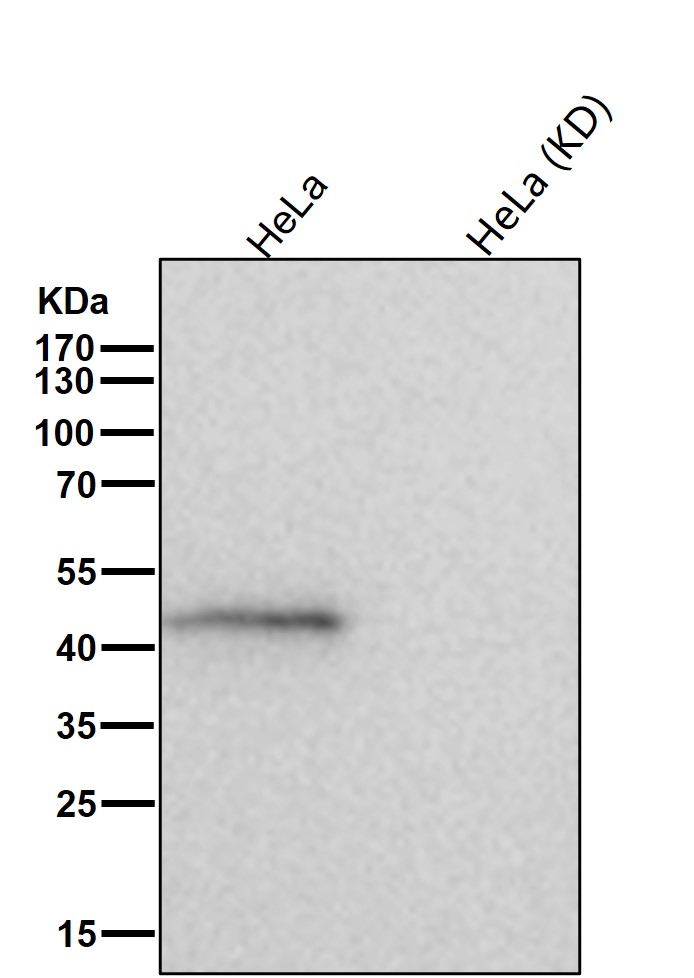

| WB | 1/1000-1/2000 | Human,Mouse,Rat |
| IF | 咨询技术 | Human,Mouse,Rat |
| IHC | 咨询技术 | Human,Mouse,Rat |
| ICC | 技术咨询 | Human,Mouse,Rat |
| FCM | 咨询技术 | Human,Mouse,Rat |
| Elisa | 咨询技术 | Human,Mouse,Rat |
| Aliases | Adenosine kinase; adk; AK;;ADK |
| WB Predicted band size | Calculated MW: 41 kDa ; Observed MW: 46 kDa |
| Host/Isotype | Rabbit IgG |
| Antibody Type | Primary antibody |
| Storage | Store at 4°C short term. Aliquot and store at -20°C long term. Avoid freeze/thaw cycles. |
| Species Reactivity | Human,Rat |
| Immunogen | A synthesized peptide derived from human ADK |
| Formulation | Purified antibody in PBS with 0.05% sodium azide,0.05% BSA and 50% glycerol. |
+ +
以下是3篇关于ADK(腺苷激酶)抗体的示例文献(内容为模拟概括,实际文献需通过学术数据库检索确认):
---
1. **文献名称**: *Adenosine kinase in the pathogenesis of epilepsy: a potential therapeutic target*
**作者**: Boison D, et al.
**摘要**: 该研究探讨了ADK在癫痫发生中的作用,通过特异性抗体检测发现ADK在癫痫模型脑组织中的表达显著升高,表明其可能通过调节腺苷水平影响神经元兴奋性,提示靶向ADK的抗体工具可用于疾病机制研究和治疗开发。
2. **文献名称**: *Immunohistochemical analysis of adenosine kinase expression in glioblastoma*
**作者**: Björklund S, et al.
**摘要**: 研究利用ADK特异性抗体对胶质母细胞瘤组织进行免疫组化分析,发现ADK的高表达与肿瘤恶性程度和患者预后不良相关,提示其可作为癌症生物标志物或治疗靶点。
3. **文献名称**: *Development of a monoclonal antibody against human adenosine kinase for functional studies*
**作者**: Zhang Y, et al.
**摘要**: 本文报道了一种新型ADK单克隆抗体的制备与验证,通过Western blot和免疫荧光证实其高特异性,并应用于ADK亚细胞定位及酶活性调控机制的研究,为ADK相关疾病研究提供了可靠工具。
---
**建议**:实际文献可通过PubMed、Google Scholar等平台以关键词“Adenosine Kinase antibody”“ADK immunohistochemistry”等检索,并筛选近年的高被引研究。部分数据库(如Sci-Hub、ResearchGate)可获取全文。
**Background of Adenosine Kinase (ADK) Antibodies**
Adenosine kinase (ADK) is a key enzyme responsible for regulating intracellular and extracellular adenosine levels by catalyzing the phosphorylation of adenosine into adenosine monophosphate (AMP). This reaction maintains low adenosine concentrations under physiological conditions, thereby modulating adenosine receptor signaling. ADK is crucial in purine metabolism and cellular energy homeostasis, with high expression observed in the liver, brain, and kidneys.
Dysregulation of ADK activity is linked to various pathological conditions. Reduced ADK function elevates adenosine levels, which can exert neuroprotective, anti-inflammatory, and anticonvulsant effects via adenosine receptors. Conversely, ADK upregulation is associated with conditions like epilepsy, ischemic injury, and cancer progression. These dual roles make ADK a potential therapeutic target for neurological disorders, cardiovascular diseases, and oncology.
ADK antibodies are essential tools for detecting and quantifying ADK expression in research. They enable studies on ADK's tissue-specific distribution, regulatory mechanisms, and pathological roles through techniques like Western blotting, immunohistochemistry, and ELISA. Recent advances in ADK-specific antibodies have improved the understanding of its splice variants (e.g., cytoplasmic ADK-L and nuclear ADK-S) and their distinct functions. Such research aids in developing ADK-targeted therapies, including small-molecule inhibitors or gene-editing approaches, to modulate adenosine signaling in disease contexts.
×